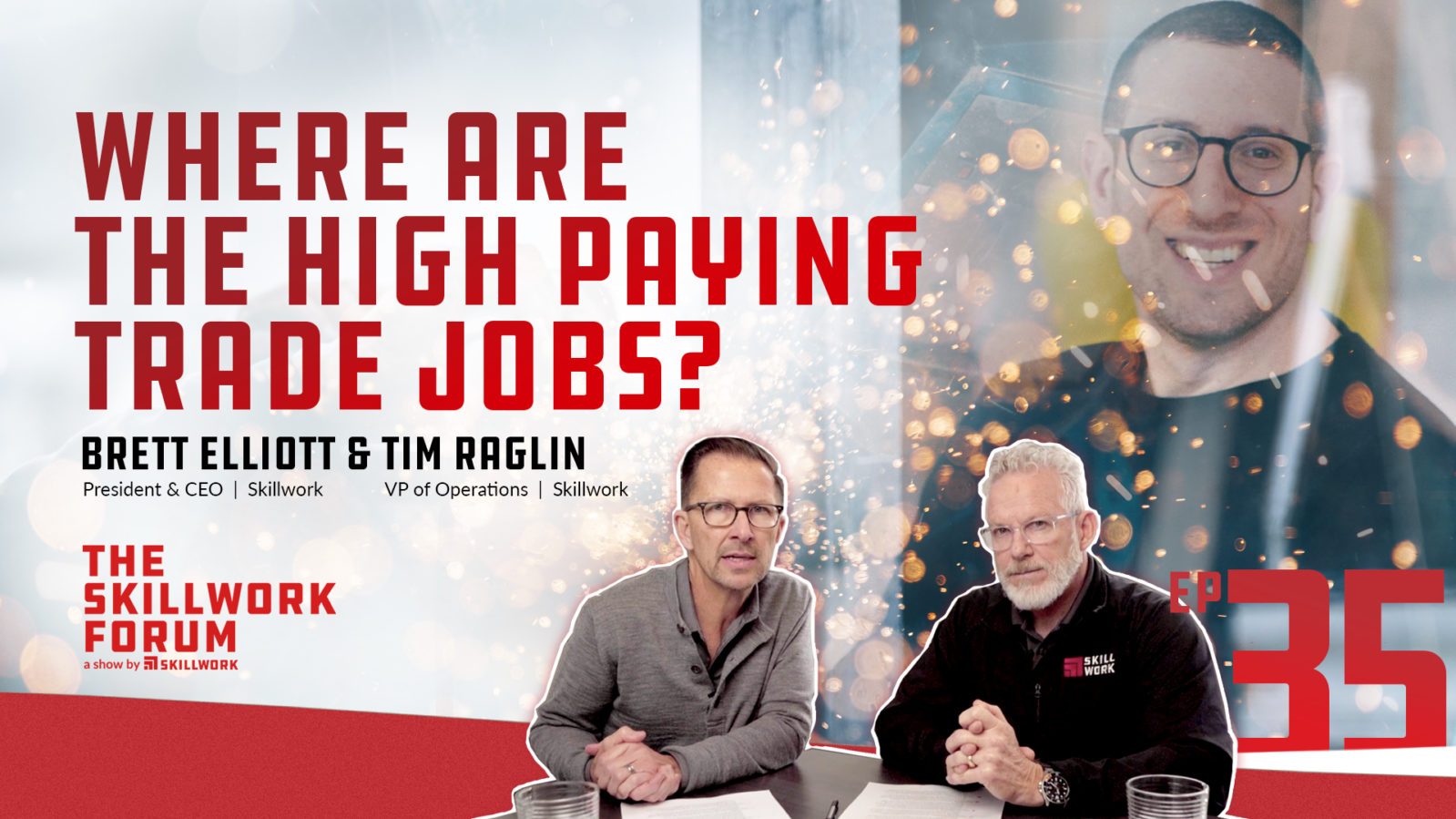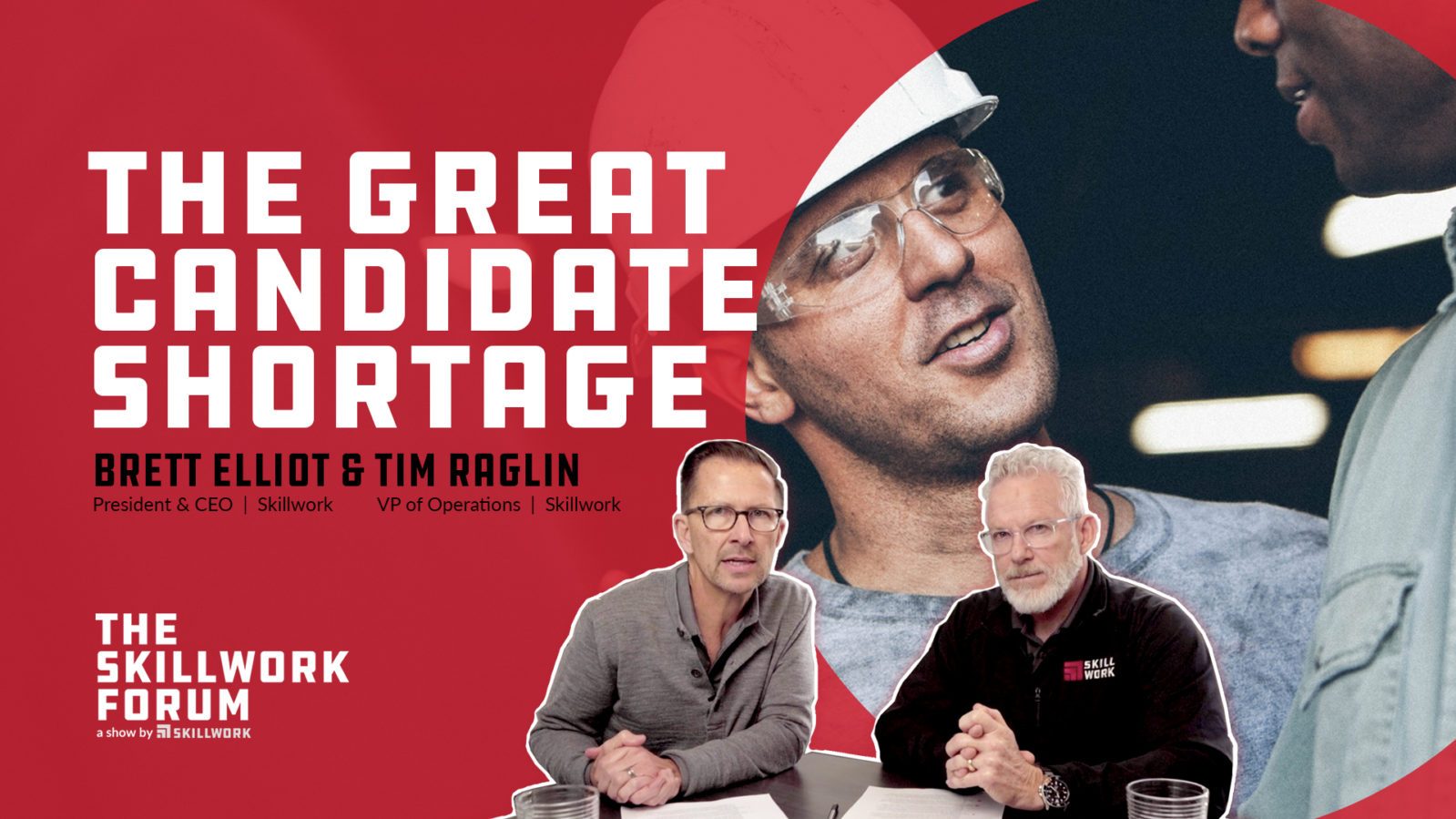How to Listen, Persevere and Succeed in the Trades - with Jeff Robertson
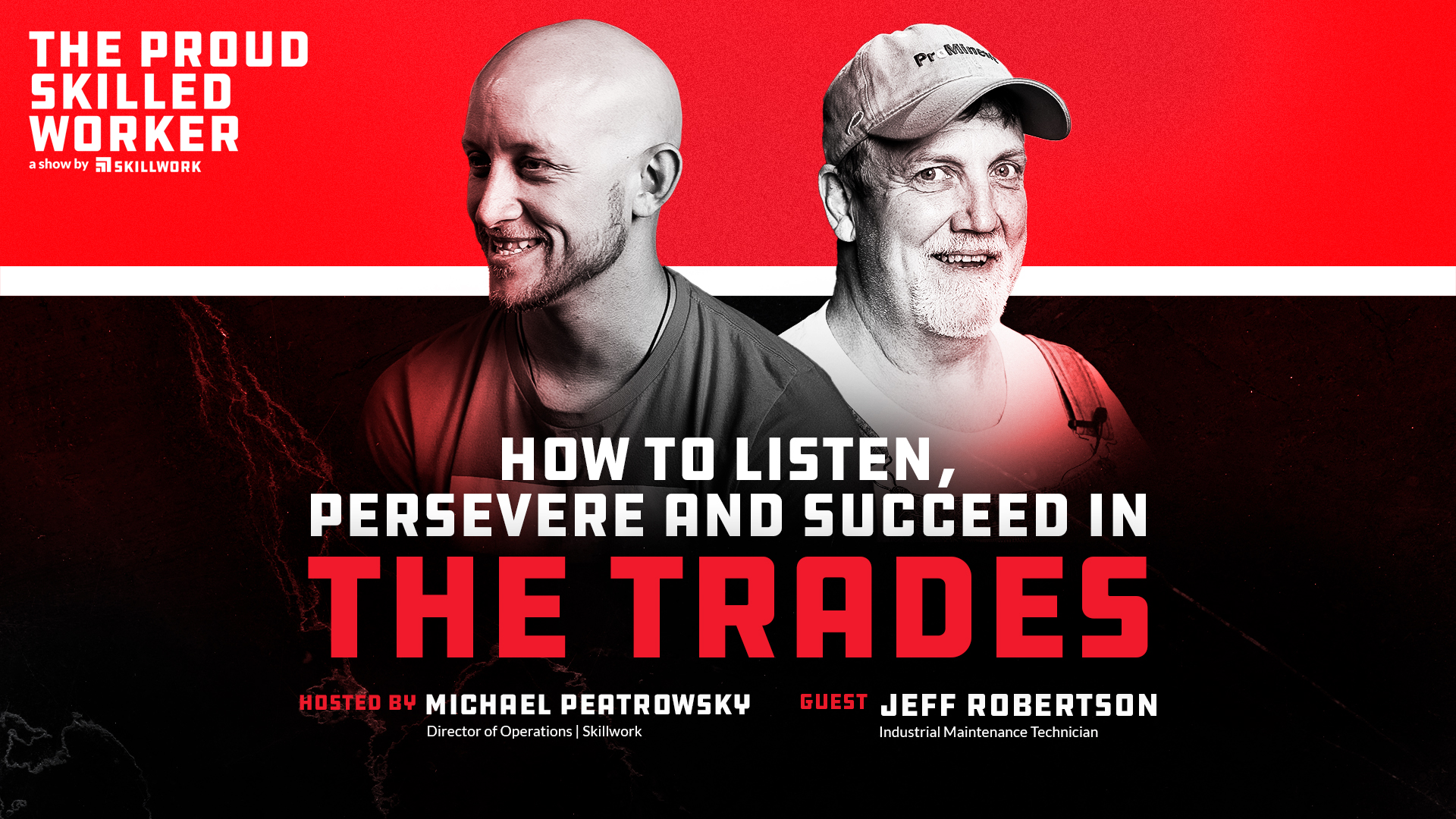
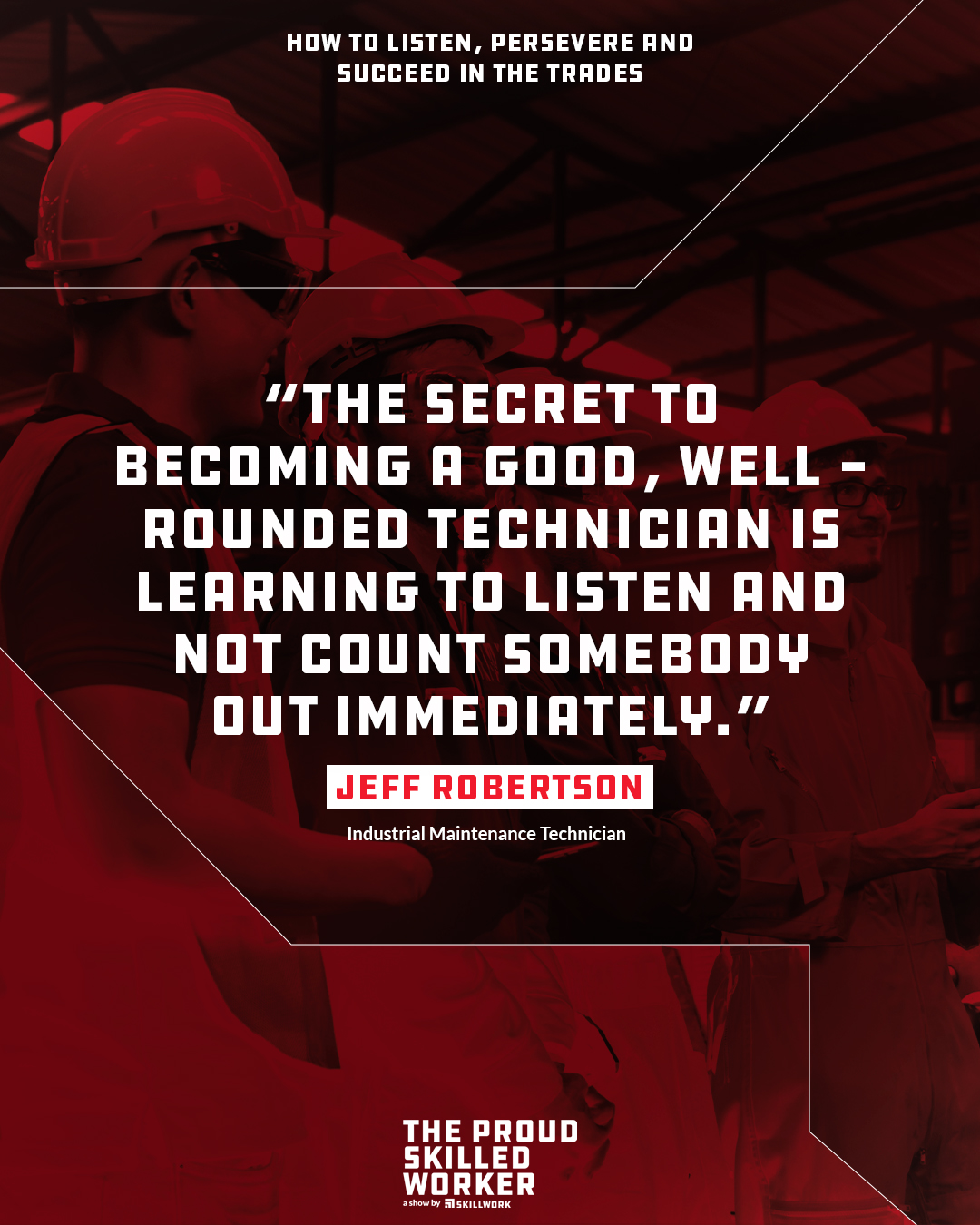
Full Transcription:
Michael Peatrowsky 00:13
Hello, everybody and welcome to another episode of The Proud Skilled Worker. Today we have an opportunity to interview Jeff Robertson. We got to do today's interview live and on site in Jackson, Tennessee. Jeff, how are you today, buddy?
Jeff Robertson 00:24
I'm doing well. Thank you Michael.
Michael Peatrowsky 00:26
Good. So today's podcast, what we're going to do is we'll go through your story, we'll go through how you got into the trades, we'll ask some questions from some of the skilled trades and skilled workers out into the field. We'll give you an opportunity to tell people what you think is the most important part about what you do. We'll close it out. Wrap it up. High five and get out of here. You're good with that?
Jeff Robertson 00:42
Sounds good.
Michael Peatrowsky 00:43
All right, sir. So first thing is, how did you get into the trades Jeff?
Jeff Robertson 00:47
Actually, by accident. I went into the military and I went through a tank mechanics course with in the army they call it no, no goes and I got a letter of recommendation from the colonel. And I took it to get a fork truck job and plant manager saw the letter and he started me in maintenance.
Michael Peatrowsky 01:06
Tell me a little bit about no, no goes.
Jeff Robertson 01:09
That in army testing you're either it's black and white. Either go or no go. And so I just happened to it wasn't because I was smart. It was just because I was polite and,
Michael Peatrowsky 01:23
You got a good grade.
Jeff Robertson 01:25
Yeah.
Michael Peatrowsky 01:26
All right. So catalyst for your career, you're in the army, you take a pass fail test. Pass it. All right. Moving on, you get into maintenance, get out of the army. Tell us a little bit about your life story between the army and today.
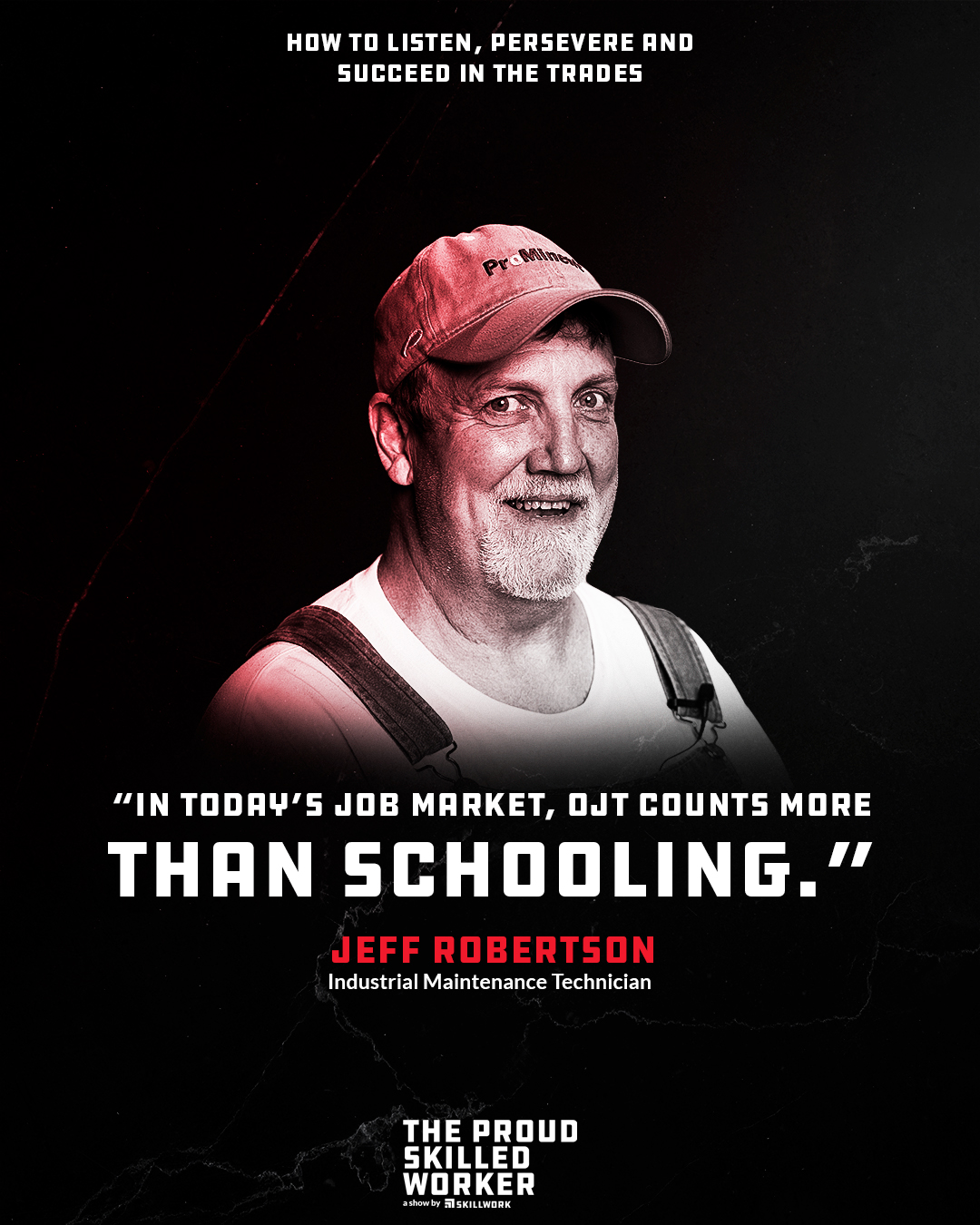
Jeff Robertson 01:37
Okay. Well, I've always worked as an industrial maintenance technician. And later on in my career, I took some night classes and got went more towards the electrical side. I did that for years, but I had an issue. I drank a lot. And it eventually, the body can't take that. And it eventually caught up to me. I ended up going into a Christian program that was a year long and sobriety, it was that's all it was for sobriety. It didn't matter whether it's alcohol or drugs or whatever. But, I went through that it was in Springs Rescue Mission in Colorado Springs, the New Life program, and they gave me a second chance. And now I'm back, doing the best things I've ever done in my career.
Michael Peatrowsky 02:25
Fantastic story. I mean, I know that climbing that ladder and getting all the way up, as you said, industrial maintenance and classes and certifications and moving up and then being humbled in that moment. Going through that that experience you went through there in Colorado, and then coming out of it the way that you are right now, Jeff, I mean, tell us a little bit about where you are since that since that program since since that moment.
Jeff Robertson 02:47
All right. Well, I was having trouble getting hired. Because I had before my alcoholism, had a great work history everywhere I went. But due to tardy and missing, I went through a lot of jobs in the last five years before Skillwork and Skillwork, I told them my story, they gave me a chance, they gave me all the tools necessary to succeed. I mean, my recruiter is asking me all the time, is there anything I can help you with? And it's just it's nice to have that support because it's very humbling telling my story, telling the world that you're you had a bad issue and it's it's nice that you have Christian Christian organizations like Skillwork that care. They're, they're more than willing to give a second chance.
Michael Peatrowsky 03:34
Yeah, I know that for us at Skillwork it's been a blessing to have you, almost two and a half years you've been with us. You coming on to the here and telling your story and speaking into what you've truly been through in life. I think it's important to, for us as individuals, for us as men and for us as as employees and employers to be real with each other and go, Hey, this is where we are in life. This is who we are. And let's move forward together. And you said it, redemption and a comeback story. Everybody does love a comeback story. And this is Jeff's, this is gonna be a good one. It's already on that path. And I mean, you've said it yourself. You're you're moving up and you're having a great time doing it. So I appreciate you telling us your story. And definitely coming out here and tell that to everybody who listens and as a part of this. It's huge for me to hear that it's huge for people to hear that. Thank you. Thank you so much for doing that for us today.
Jeff Robertson 04:21
You're most certainly welcome. Skillwork has done so much for me. I'm glad anyway, I can help Skillwork.
Michael Peatrowsky 04:27
It's it's definitely a blessing. I think as we transition, I want to talk a little bit about what is what do you feel like is the greatest challenge in the industry today? What's the biggest challenge you are facing in the industry today?
Jeff Robertson 04:39
Just technology. It's evolving so quick that you have to pretty much take a refresher course or something if you're not actually working with it to keep up. You, I mean, it's evolving so quick, just like computers and cell phones and same way with PLCs and drives and all sorts of different engineering inventions, you know?
Michael Peatrowsky 05:01
Yeah, we talk a lot about this fourth industrial revolution or this automation revolution that's coming. And you hit it on the head, right there is, it's not slowing down for the people in the field, they need to either get on board or get off because it's, it's a train and it's coming through. That's great. So, as we transition into the next part, Jeff, I have some questions here from some of our actual skilled workers in the field, they've reached out to us, asked us questions, I'm going to shoot those to you and open the floor. And you and I'll just talk through what those look like okay? So our first question comes from Dwayne F. He says, What's a cost effective way to advance what you already know, to become better?
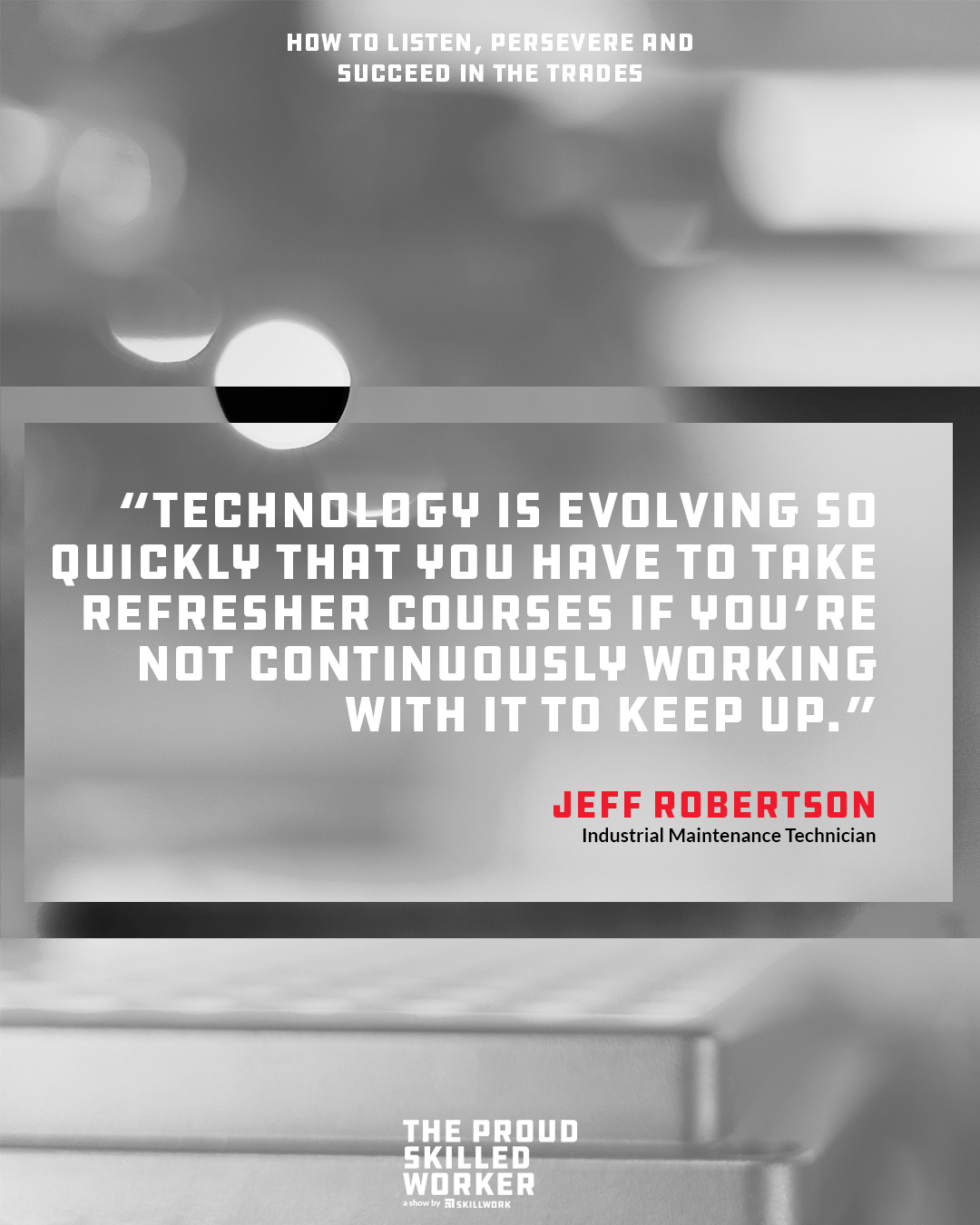
Jeff Robertson 05:38
One good thing about working in an industrial environment you usually have access, the maintenance guys usually have access to calling machines specific technicians. And that's a great resource to further your skills, you know, because you can see, they can share with you how their company is putting something together. Again, that's not exactly the words I'm thinking of. But,
Michael Peatrowsky 06:03
I think what I hear you saying is, is when you reach out to those subject matter experts, or those those gurus on that equipment, continue to kind of pick their brain and learn from them and read into the publications they're putting together and their standard operating and maintenance procedures that they have. When you have those subject matter experts available to you, do you feel like they're willing to teach you? Willing to pour that knowledge back into you?
Jeff Robertson 06:24
Oh, yes.
Michael Peatrowsky 06:25
And, and typically at no cost to you, because it's part of the maintenance.
Jeff Robertson 06:28
Right, that's another thing I was going to point out, there's no cost. I mean, the company, they've already got some kind of contract with the machines. So free advice.
Michael Peatrowsky 06:37
In your opinion, do you feel like people are willing to ask extra questions? Or are people more focused on today's problem and not looking to the future? When you call that subject matter expert, and you're like, hey, we have a machine down. Are you asking one question and then getting off the phone once you have that answer, or do you think people should be getting more and more questions about why did it break? How do we fix it next time? What's the best way? Are they willing to give you guys that information?
Jeff Robertson 07:01
Oh, yes, yes. I think if you probe the, at least the technicians I've worked with have been very forthcoming. As long as you ask them, you know, what could have caused this? They usually have a good insight. But back to the question, do I usually just call and get one? Yeah. Because we're wanting to get it up and going and then I'll go back and you know, if I have a question about what caused it or something, but you that is a great source of information.
Michael Peatrowsky 07:30
The need of today sometimes outweigh the knowledge gain you're looking for. I understand that, I understand that.
Jeff Robertson 07:36
Your boss.
Michael Peatrowsky 07:39
So kind of our next question here is, is how do I advance when I have all the skills from experience but no schooling to go along with it? And that's from Robert H.
Jeff Robertson 07:48
Just how do you advance when you have all this skills? I didn't have all the skills or the all the schooling? I don't know, I think in today's job market, OJT counts more than schooling.
Michael Peatrowsky 08:02
I agree with that.
Jeff Robertson 08:03
That's my personal take on it. Yeah, it would be nice to have that little letter or certificate, but of what I've seen long as you can pass a test or that they give you, I've never had to have any schooling.
Michael Peatrowsky 08:18
That's great. We talk about and for Robert sake, the individual who asked this, when he talks about advancing, do you think a lot of this comes down to individuals asking for that? Like, do you feel like on your maintenance floor on the maintenance teams, you have the ability to go to a maintenance manager or to go, hey, I want to take on bigger and better challenges. I want to do something better? Are people willing and open to give you those opportunities? If you ask for it?
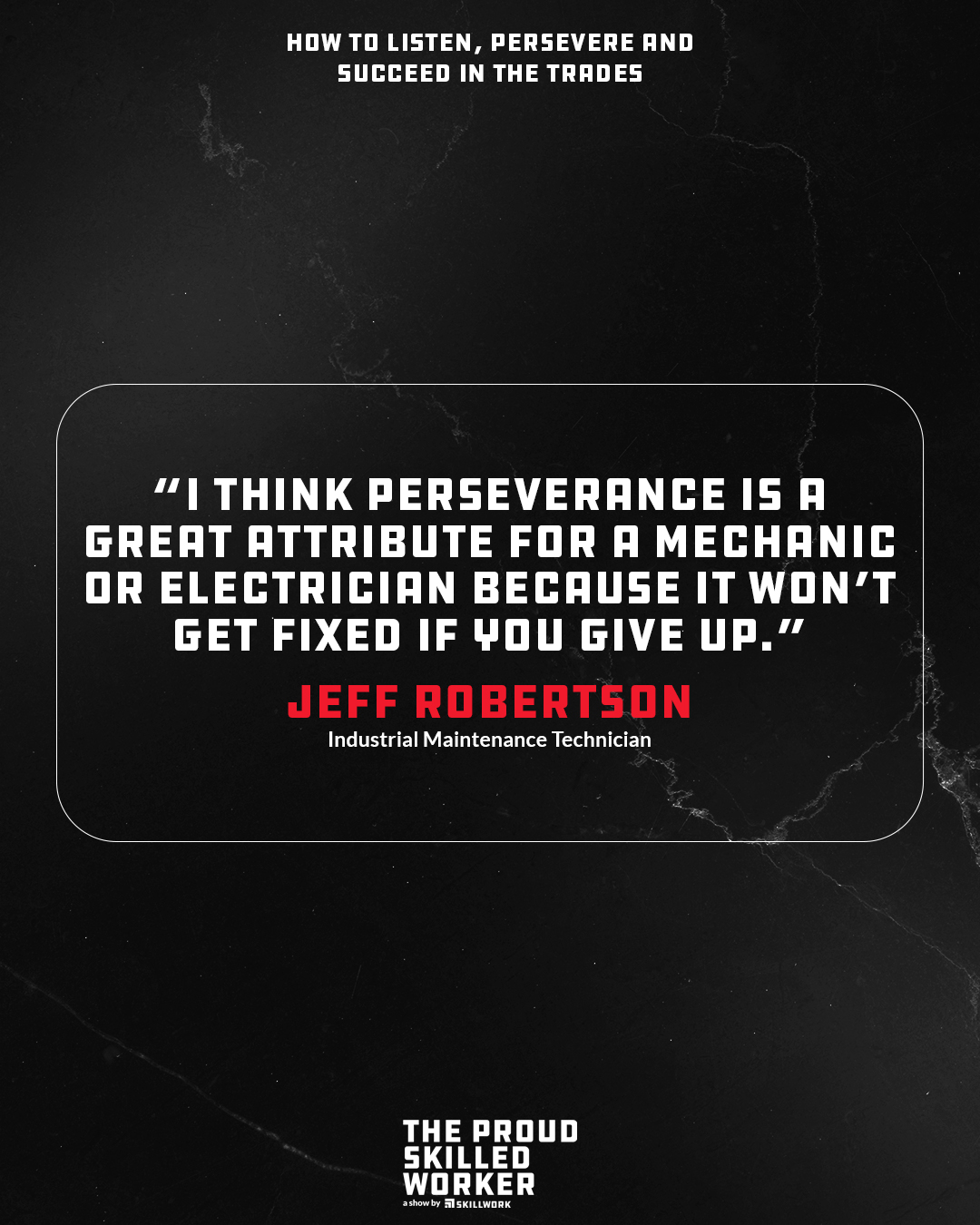
Jeff Robertson 08:40
Oh, yeah. You just have to be very careful and make sure whenever you ask for that, that you deliver, or the next time you ask, you may not get the response you like, you know? But yeah, every maintenance manager I've ever had is all behind you learning all you can learn.
Michael Peatrowsky 08:59
Talk to me more about how you know when it's the right time to ask. As you just said, You got to be careful when you ask that question to make sure you deliver. How do you know when it's time for you to to grow into more machines and to grow into that knowledge base?
Jeff Robertson 09:10
Well, you got to have that confidence. I mean, if you don't, if you're not confident going into a job that tells me that you haven't you don't know all the ins and outs of that job. I wouldn't have a whole lot of confidence if I didn't know exactly how everything was that I was fixing to dig into was working, you know?
Michael Peatrowsky 09:30
You think that takes more time or more research? I mean, do you think that's best acquired that that knowledge and that confidence?
Jeff Robertson 09:37
Experience. Unfortunately, research is great, but I've found that looking at a manual sometimes doesn't always correspond your manual may not always correspond pictures and what to what you actually have. And I've found that the best thing is just to dig into it, see.
Jeff Robertson 09:56
Yeah.
Michael Peatrowsky 09:56
Yeah, that ties back to what you said like OJT in today's world is, is the number one it is the hot commodity right now, because as you mentioned, sometimes the diagram doesn't match. Sometimes the engineer drew it in a perfect way but practically it doesn't get built that way. And it doesn't work that way. So I think you hit the nail on the head when you said it earlier. OJT is the thing, the way to advance your career and to advance what you're doing is just to stay on your job on the job, to continue to learn and grow new things, ask for new opportunities and reach out, when you have those times where, hey, let me shadow you when you do these things. Let me watch you do that if you have time to watch other people do stuff.
Michael Peatrowsky 10:24
Our next question, Jeff, comes from Dan J. He said, What's the secret to becoming a good well rounded technician?
Jeff Robertson 10:39
Listen, listen, there is and not just the engineers and all that, but you can learn something from everybody. Learning to listen and not count somebody out immediately. I think you I think it takes some people skills also. Because you I mean, not one person knows the whole plant. Any I mean, I've been in this business my entire career. I've never found one person who knew you knew the whole plant. You have to pretty much network and find the guys that you feel can help you.
Michael Peatrowsky 11:11
What's what's one thing that you think in your life, you've learned through that that listening skill? What is the one thing that you were taught in a moment where you least expected to learn something just by like listening?
Jeff Robertson 11:23
I was working for Rural Electric and won't even remember what we was doing, but first year apprentice show me how to drill something a whole lot better and I'd been struggling with for my entire career. And he comes up and just does it the simple way and he'd learned it from his dad, of all. You know? And little things like that. I can say I feel you can learn learn something from anybody. Yeah, you know? More so some than others. Don't count, don't count people out whenever you're dealing with a problem because it may be a person that you don't even think has a clue what's going on that gives you the answer.
Michael Peatrowsky 12:03
Yeah, I think that that's a it's a soft skill that people tend tend to not have any more. We use our one mouth way more than our to ears lately.
Jeff Robertson 12:10
Bowie, I reckon.
Michael Peatrowsky 12:13
Our last question comes from Richard M. And he says, what do you what is the future hold for mechanics? Just pure mechanics, he wants to know.
Jeff Robertson 12:21
Future looks good. There's, there's always gonna be mechanical. Unless they come up with some kind of magic, there's always gonna be mechanics and pneumatics and hydraulics and electrical involved in moving in or machinery.
Michael Peatrowsky 12:38
So unless magicians get into the maintenance, we're gonna be fine.
Jeff Robertson 12:43
We're good to go.
Michael Peatrowsky 12:44
Happy to hear that. So, Jeff, this is the part where I open the floor to you. I like to give you 5, 10 however long, and I just want you to tell everybody in the world, everybody in the industry, something you wish you would have known in your life, something that you could stand up on a on a pedestal, if you had an opportunity, which we're giving to you and just go, here's the thing that you need to do to be better at your job, to have a better life, to live to live better in the maintenance world. So if you were in front of every junior maintenance technician in the United States, what's the one message you would give them?
Jeff Robertson 13:17
Listen, listen, sometimes it's best. I know, it's hard, but even I'll listen. Because sometimes that's exactly it. Persevere, listen, that's the I think perseverance is a great attribute for a mechanic, electrician, whatever, somebody that stays after it. Because it's not going to get fixed if you go, well I just can't do it. So my advice would be to just give it your all and and throw yourself into your work and things get a lot easier. You don't always have to throw yourself into your job. Once you gain experience you go, Oh, well I don't need to do that. You know, and there's other ways and you just learn easier ways through repetition you learn easier ways of doing things.
Michael Peatrowsky 14:07
Listen, persevere, succeed, seems pretty easy. Alright, Jeff, so recently you had an opportunity to go on a trip with Skillwork down to Texas. Tell us a little bit about that trip, about what you did, kind of just all in all how was that?
Jeff Robertson 14:20
It was awesome. I was able to go down and turkeys and hogs with the COO of Skillwork and he was just as down to earth and felt like the guy next door you know? And had a great time. Texas Boys Outdoors hosted us. They went all out between the food and the hunting and the guiding and the processing our quarry. They did great.
Michael Peatrowsky 14:46
So they processed for it. They processed everything you shot for you?
Jeff Robertson 14:49
Yes. As a matter of fact, it's sitting in my on my front doorstep right now. Wait, it's been shipped UPS, it's cold. So,
Michael Peatrowsky 14:57
Sitting right now?
Jeff Robertson 14:59
Yeah.
Michael Peatrowsky 14:59
I gotta get out of here. So while you were down in Texas, tell us a little bit about the ranch or the cabins. I mean, what was that like?
Jeff Robertson 15:06
I mean, it was kind of eye opening because it was within eye site of the border. This ranch, I think it was 12,500 acres. And they had all kinds of game cam pictures of the people, unfortunately, that are crossing. It was, it was a great time. Like I say, Texas Boys Outdoors went all out. They got it. The they did everything. All we had to do is show up show up. And it was a great time.
Michael Peatrowsky 15:35
So pretend it's just you and me.
Jeff Robertson 15:39
Okay.
Michael Peatrowsky 15:39
How many times did Tim miss?
Jeff Robertson 15:41
Oh, I think just once.
Michael Peatrowsky 15:43
Just one?
Jeff Robertson 15:44
He had, there was a turkey way out there. And it was fighting another turkey. And he shot and missed. And then he shot the second shot. He cleanly hit it right in the neck.
Michael Peatrowsky 15:58
Oh, wow.
Jeff Robertson 15:59
Yeah a very good shot.
Michael Peatrowsky 16:00
That's great. Yeah, trip was good, though? You had a great time?
Jeff Robertson 16:03
Oh, had a good time.
Michael Peatrowsky 16:04
Good, super happy.
Jeff Robertson 16:05
It's good to know, like I say I got to meet Tim. And it's good to know that there are our leadership is on the right track I believe.
Michael Peatrowsky 16:14
They definitely care about you. Definitely not a number. I can tell you that being in the office. I tell you that being right here next to you. This is real for us. It's something that we do and it's something that we don't just say, it's an action for us. So it's how we live our day to day lives.
Jeff Robertson 16:28
Y'all are proven it to me.
Michael Peatrowsky 16:30
Thanks, Jeff. I appreciate everything. I appreciate everybody. And thank you so much for tuning into The Proud Skilled Worker. Continue to watch us on YouTube, Apple podcasts and anywhere that you get your podcasts. We put out new episodes every two weeks. Leave comments, reach out to us, shoot us an email. We'd love to hear from you. We'd love to have you on the show. Thank you so much, everybody.
